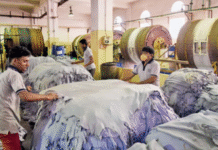
A file photo shows clients are busy in banking transactions at a private commercial bank in Dhaka. The National Board of Revenue is mulling elimination of multilayer taxes on dividend income of shareholders of companies, including banks, from the upcoming budget for fiscal year 2018-2019. — New Age photo
National Board of Revenue is mulling elimination of multilayer taxes on dividend income of shareholders of companies from the upcoming budget for fiscal year 2018-2019 amid strong demand of corporate taxpayers, NBR chairman Md Mosharraf Hossain Bhuiyan said on Sunday.
The NBR was now working to synchronise the distribution system of tax derived from dividend income, he said in response to a demand of Metropolitan Chamber of Commerce and Industry for scraping the multilayer taxation on dividend income.
The MCCI made the demand while placing their budget proposals for FY 2019 at a pre-budget discussion with the tax authorities held in the latter’s conference room.
The trade body sought a strong policy package for industrial and agricultural infrastructure, reduction in the rate of corporate tax, elimination of double taxation on dividend, increase in the tax-free individual income limit, lowering the highest slab of individual income tax rate and special attention to banking sector management in the next budget.
Seeking special attention to banking sector, it said that all banks were facing liquidity crisis and it would cause big problems in future if the situation did not improve.
‘We are trying to find out a formula so that tax is imposed on the income only once,’ he informed, adding that NBR already discussed the issue with finance minister AMA Muhith.
Currently, tax on dividend is applicable at every stage of distribution of dividends among shareholders considering the amount as their income.
Earlier, other trade bodies including Federation of Bangladesh Chambers of Commerce and Industry had also demanded elimination of the current system of taxation on dividend saying that it caused double taxation on the same income.
MCCI tariff and taxation sub-committee chairman Hasan Mahmood placed the proposals at the meeting.
The trade body demanded measures for removal of infrastructure deficiency and attracting both domestic and foreign direct investment and reduction of disparity between different types of domestic industries through reducing duties on imports of raw materials and intermediate goods.
Corporate tax rate for non-publicly traded company should be reduced by five percentage points to 30 per cent from the existing 35 per cent to narrow down the difference in tax liability between listed and non-listed company, it said.
Currently, the tax rate for publicly traded company is 25 per cent.
For others, corporate tax should be lowered by 2.5 percentage points in the next budget, it added.
The chamber also demanded that the NBR increased the tax-free income ceiling to Tk 4.5 lakh for individual taxpayers from existing Tk 2.5 lakh as the NBR did not raise the limit for last three consecutive fiscal years though the cost of living increased significantly over the years.
The MCCI also sought reduction in the rate of the highest slab income tax to 25 per cent from current 30
per cent and increase in investment rate for tax rebate.
It also demanded lowering of the rate of surcharge on net wealth, rising tax-free allowance on house rent, transport and medical cost.
It recommended that NBR continue the existing export tax rate of 0.70 per cent up to June, 2019.
The chamber also demanded repeal of a provision of the income tax law under which an employer must ensure submission of income tax returns by its employees for getting tax benefit on expenditure for salary and other allowances given to the employees.
Submission of income tax returns is a responsibility of the particular individual taxpayer and NBR should not impose the responsibility on the employees, it said.
It also sought prospective effect of tax measures related to tax rates from the beginning of the fiscal year instead of the previous year.
MCCI vice-president Golam Mainuddin hoped that the government would not formulate an election-oriented budget rather it would prepare a prudent and development-oriented budget for the next year to face the ongoing economic crises.
MCCI committee member M Anis Ud Dowla, also chairman of ACI Limited, demanded withdrawal of trade VAT on super-shops and advance income tax on imports.
Source: New Age.









